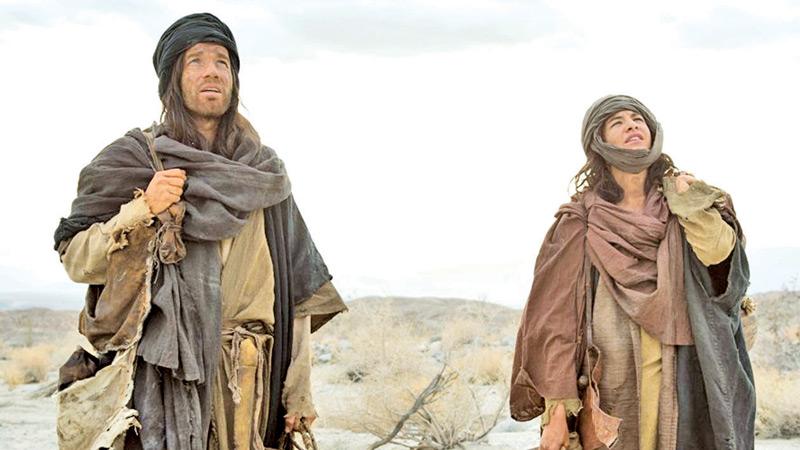
Many are the cinematic works based on the life and times of Jesus Christ. Among this category of movies, ‘Last Days in the Desert’ written and directed by Rodrigo Garcia (who incidentally happens to be the son of literary legend Gabriel Garcia Marquez) is a drama film that is quite unique. With a small cast of five characters, played by four actors, since the lead actor Ewan McGregor who plays the character of Jesus also doubles as the character of Satan; what Rodrigo offers the world of cinema is a cinematic meditation through the language of motion pictures.
 The movie is set in the period where Jesus Christ is said to have spent 40 days fasting and praying in the Judean desert, battling the temptations of Satan. The cinematography by Emmanuel Lubezki brings the viewer a stark projection of austerity through his vision of portraying the desert as well as the human spirit that becomes conditioned by its environment. A movie with limited dialogue, Last Days in the Desert gives life to the aridness of the desert as well as the potential of the richness of the human spirit’s fortitude that forges ahead against odds.
The movie is set in the period where Jesus Christ is said to have spent 40 days fasting and praying in the Judean desert, battling the temptations of Satan. The cinematography by Emmanuel Lubezki brings the viewer a stark projection of austerity through his vision of portraying the desert as well as the human spirit that becomes conditioned by its environment. A movie with limited dialogue, Last Days in the Desert gives life to the aridness of the desert as well as the potential of the richness of the human spirit’s fortitude that forges ahead against odds.
Jesus, in this film is referred to as Yeshua (the Hebrew name for Jesus Christ) and portrayed by Ewan McGregor, who in his wandering in the desert, encounters Satan (also played by McGregor), depicted as a doppelganger whose true nature is suddenly revealed through the quick glimpse of a long leathery tail which is made visible at just one instance in the many times he marks his presence in the narrative.
The temptations that Satan casts before Christ to break his vows and devotion to God, take the form of creating doubt in Christ about the goodness of his creator. Satan who claims to know God quite well, describes God as a vain and temperamental ruler. Among the mockery that Satan casts at Jesus is a memorable line “I am a liar - that is the truth”. In that very line there sounds a Satanic bid to sow doubt in the heart of Jesus. Being a mirror image of his own visage, the remarks of Satan are perhaps meant to be symbolic as the possible ‘human doubt’ within Yehshua over his creator, which he is trying to expel from his consciousness.
A holy man seeking purification must battle firstly whatever doubts that may linger internally, no matter in how small a recess of his consciousness, as to whether the trust he has in providence is real, and the truth he has discovered, or is in the process of discovering, is in fact undisputable. For what he will thereafter discourse to the world as what has been revealed to him, will change the course of humanity.
The days and nights endured by Yeshua in the desert are ones where he is made to face some of his fears within him that surface as nightmares. In one such nightmare he is chased by wolves. Another, shows him nearly drowning. These quick, snapshot like moments show how fragments of fear surface in his mind. A mind that seeks oneness with his God.
In the desert, Yeshua comes across a family of three. A father, a mother and a son. Their setting seems austere and simple yet their ‘function’ in the scheme of Yeshua’s journey is complex. Yeshua encounters them building a small house on top of a flat rock surface near a precipice, and he befriends them, offering to help them in their task.
The father of the family is a man set in his ways who refuses to take his family to Jerusalem even though his wife is sick in need of medical attention. The son secretly desires to live in a society of humans as opposed to the life of isolation their father imposes on him and his mother.
The family’s own subsistence and purpose seems existential yet appears to render a symbolic meaning in Yeshua’s journey. His bond to them brings him to question his own purpose in the lives of others in an environment of seeming emptiness. What change can he bring to them, and what temptations can he fight? In his discreet words to the boy to disobey his father and seek his dream of going to Jerusalem, does Yeshua symbolically inspire disobedience to ‘the father’? Is man’s place on earth to be unquestioningly obedient to the authority of the patriarch, or is rebellion selectively appreciable? One cannot forget in this context that it was rebellion that cast Lucifer out of heaven.
When the mother in the family of three slips into Yeshua’s shelter at night and offers herself to him, the temptation of the flesh is apparent. Yeshua’s successful resistance of the temptations of the flesh, and his deeper understanding of the ways of ‘human bonds’ enriches his being through his encounter with the small family, and thus better prepares him for his divine journey as Jesus Christ whose purpose on earth was to set forth to redeem mankind from sin.
Last Days in the Desert brings to viewers a facet of the life and character of Jesus Christ which takes one deep into his humanness in the context of dire isolation, and a voluntary ‘cocooning’ of himself in order to realise his higher self, and discover the divine truth which he is meant to serve.
